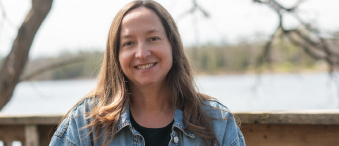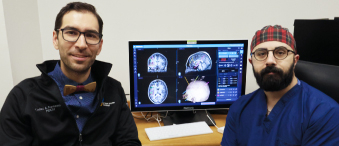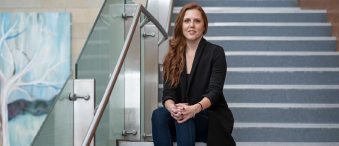Published: March 2024
Mackenzie Daybutch
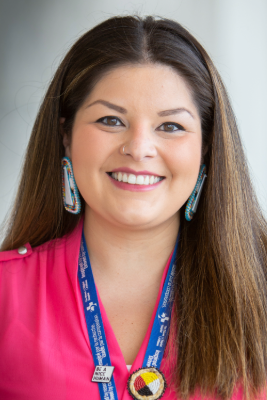
Everyone deserves to feel a sense of belonging where they work, which is made so much easier when you feel a connection with others.
This is exactly the goal of The Ottawa Hospital’s Indigenous Employee Network (IEN). Created in October 2021, the IEN’s ongoing goal is to create a safe space for self-declared First Nations, Inuit and Métis employees at The Ottawa Hospital and their allies to connect, share experiences, and celebrate Indigenous culture.
Mackenzie Daybutch is Ojibway from Mississauga First Nation #8 in North-Eastern Ontario, where she is a status band member, Bear Clan, and inter-generational residential school survivor. She is the Program Coordinator for the Regional Indigenous Cancer Program at The Ottawa Hospital and is Lead of the IEN, which she describes it as a “sacred space where indigenous hospital employees and allies can connect.”
Learn more about Mackenzie and the critical work of the IEN.
Hélène Létourneau-Donnelly
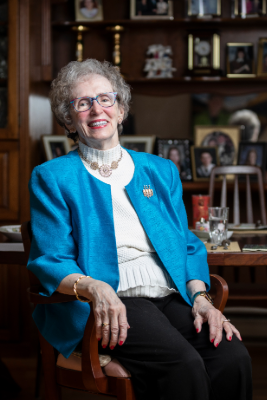
Our hospital has seen its fair share of trailblazing women, and Hélène Létourneau-Donnelly deserves to be mentioned.
Her nursing career began at the then Ottawa General Hospital in 1959, where one week after graduating as an RN, she assumed the position of Assistant Director of Nursing. Only a few years later, her talents were recognized from across town and she became a director in nursing at the then Civic Hospital. She was a young woman who chose to follow her career aspirations of caring for others at a time when other women her age were getting married and having children. Hélène would be instrumental in leading that position for the next 27 years.
She’s recognized for developing and establishing, with the support of her committed staff, a list of major hospital programs. They include the Comprehensive Surgical Day Care, which was a first in Canada, Ottawa’s first Triage Nurse Program in the Emergency Department, the Cerebral Vascular Service and Poison Information Centre, also a first in Ottawa, and the city’s first Operating Room Technical Course.
She is respected for completing a PhD (Education), without thesis, on a part-time basis during this hectic time.
Whether it was advancing care for patients or her life-long commitment to the education and wellness needs of women, Hélène has routinely been a voice and passionate advocate for others.
Hélène’s actions and commitment to care at The Ottawa Hospital have long since continued into retirement as a volunteer and as a donor—she continues to find ways to give back. Hélène has been particularly interested in supporting women’s health through the Shirley E. Greenberg Women’s Health Centre and the Rose Ages Breast Health Centre, which has a room named after her.
Learn more about Hélène Létourneau-Donnelly.
Macrina Valcin
Last year, Registered Nurse Macrina Valcin wanted to find a creative way to mark Black History Month. With some help from her colleagues on the Mother Baby Unit at the General Campus, she transformed the unit’s bulletin board into a powerful celebration of the Black community, creating an intricate display with inspirational quotes, books to borrow and posters of historical Black leaders.
Macrina’s passion project was born from tragedy—the death of George Floyd. “I decided I was going to let people see what racism is, what Black culture is,” says Macrina. “I thought maybe they can see this display and learn a little bit more and ask me questions.”
This year, Macrina brought her creative labour of love to a much larger audience. Throughout all of February, Macrina’s displays were located in the Employee Corner right outside the cafeteria doors at both the General and Civic Campuses. The displays placed a strong focus on honouring Canadian Black heroes, including athletes, politicians and entrepreneurs.
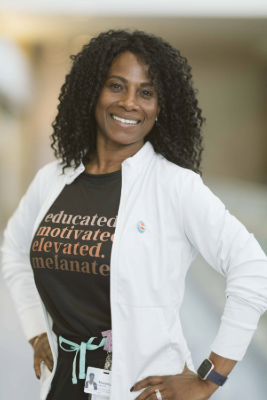
There was also a collection of books and posters that commemorate Black leaders from the past. “One of my big goals with these displays is to honour the past and inspire the future,” says Macrina.
Macrina hopes her displays will spark some difficult but necessary reflections. “I think people forget that racism is everywhere and exists every day. I’m hoping that these displays will bring about a greater awareness of what people do not see and do not know.”
Read more about Macrina and how last year’s project led to her co-leading Black Community at The Ottawa Hospital.
Mary Ierullo
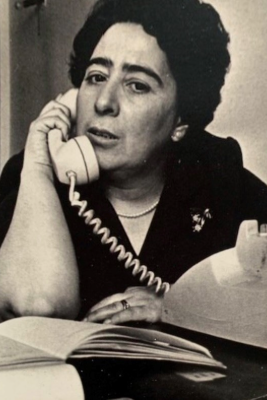
Mary Ierullo had her own children, but she was also the “other mother” to countless young women in Ottawa. After immigrating to Ottawa from Italy as a young girl in 1928, Mary was always inspired to help others.
In the 1950s, she saw young pregnant women from back home struggling, so, despite not holding an official role at the hospital, she helped set up the first prenatal clinic for immigrant women at the Civic Hospital. She held their hands, literally and figuratively, as they transitioned into motherhood in their new country.
Learn more about other amazing women like Mary in our 100 Moments series, celebrating the 100th anniversary of the Civic.
Dr. Rebecca Auer
It was only a glimpse she caught, standing on the side of the Trans-Canada Highway as it curved along Lake Superior, but since then, Terry Fox has remained a source of inspiration for Dr. Rebecca Auer. His vision and determination helped motivate her to where she is today — an award-winning cancer clinician-scientist.
Dr. Auer combines revolutionary cancer research with hands-on patient care every day in her role as Executive Vice-President of Research and Innovation at The Ottawa Hospital and CEO and Scientific Director at The Ottawa Hospital Research Institute.
As a surgeon, Dr. Auer sees with clarity that, while surgery may be the best chance for a cure in most cancers, patients are particularly vulnerable to both infections and cancer recurrence in its aftermath, in large part because the immune system is suppressed in the postoperative period. Dr. Auer’s research program is focused on understanding the mechanisms behind this effect and reversing them with innovative therapies.
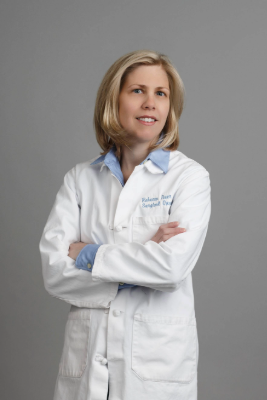
In recognition of her practice-changing research, Dr. Auer has been named the 2023 recipient of the Chrétien Researcher of the Year Award.
Learn about her childhood stint at CHEO and an alarming late night in the lab.
Marion Crowe
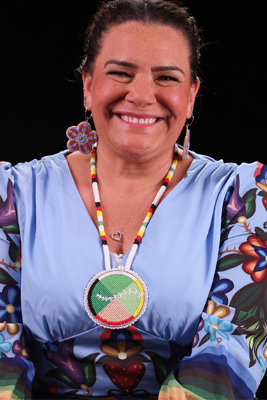
Access to culturally safe health care is a priority for The Ottawa Hospital. We’re focused on strengthening Indigenous partnerships to guide our work to improve the experiences of First Nation, Inuit and Métis patients and their families.
TOH’s journey of reconciliation would not be possible without the vision of Marion Crowe – the first Indigenous Governor at TOH and Co-Chair of the Indigenous Peoples Advisory Circle. An accomplished and award-winning leader in First Nations health equity and governance, Marion was appointed to the TOH board on Indigenous Peoples Day June 21, 2017. She is also a proud member of Piapot First Nation in Saskatchewan and founding Chief Executive Officer of the First Nations Health Managers Association.
Marion says TOH’s work to advance Indigenous priorities is a result of many candid and sometimes difficult conversations and a true willingness among everyone at the table to pursue the journey together.
“The work of reconciliation is not easy,” she says. “You cannot have reconciliation without truth, and the truth can often times be painful and discouraging. With TOH, we’ve had a willingness from the beginning to engage in the hard work of reconciliation. We’ve created a true allyship at the leadership level and a real shift in thinking is gaining momentum across the organization. I commend the dedicated members of the Indigenous Peoples Advisory Circle for showing up for their people and for change. I’m immensely proud of our work together and look forward to continued progress.”
Read more about Marion Crowe and other incredible woman of our hospital by checking out our 100 Moments series, which shares extraordinary moments from the past century of the Civic.
Dr. Emily Gear
For decades, Dr. Emily Gear and her husband, Dr. Frank Berkman, a cardiologist at the Cardiac Unit (now called The University of Ottawa Heart Institute), lived across the street from the hospital so she could be at the Civic in minutes to deliver a baby. Dr. Gear had a practice in the basement of her home with a full-time nurse.
“Her nurse was like another grandmother to us,” recalls Dr. Gear’s daughter, Janet Berkman. “She’d come up at noon and join us for lunch.”
Janet also remembers many men over the years parked in the driveway of their home on Melrose Avenue, too uncomfortable to come inside with their wives.
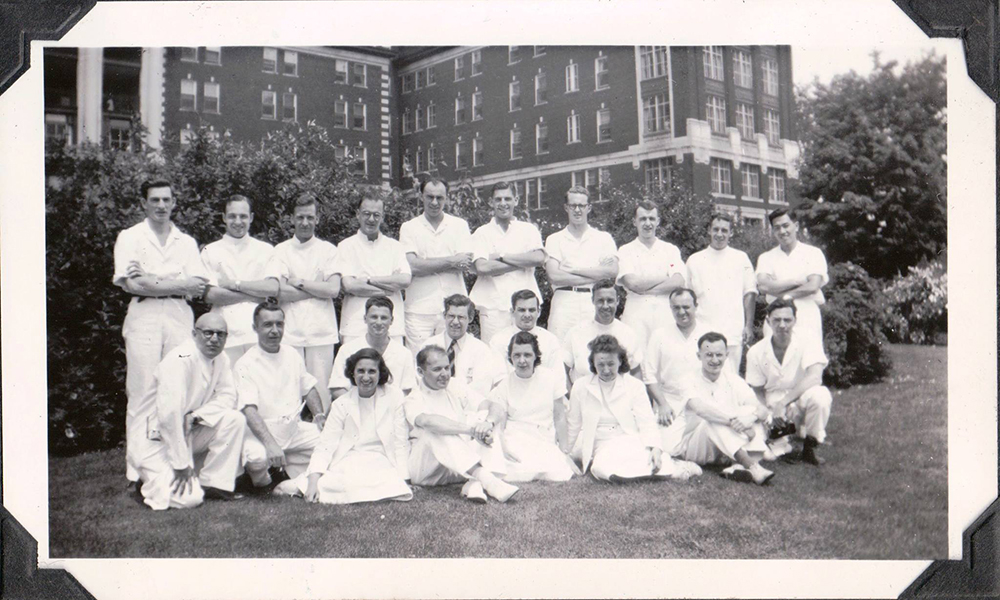
“Mom loved the people at the Civic Hospital,” Janet adds. “She did rounds there every morning and was there all the time for deliveries. The Civic was almost like her second home.”
Read more about Dr. Gear and other incredible woman of our hospital by checking out our 100 Moments series, which shares extraordinary moments from the past century of the Civic.
Dr. Kathleen Gartke
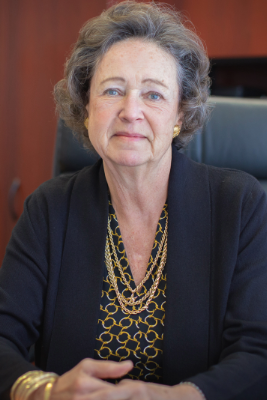
“I spent more than 25 years as the only operating female orthopedic surgeon in the city. I know what it’s like not to feel like part of the group,” says Dr. Kathleen Gartke, Senior Medical Officer at The Ottawa Hospital.
Dr. Gartke’s sentiments are not unique among many women physicians. Although women have outnumbered men in medical school for 20 years, individual and systemic biases in healthcare can prevent qualified women candidates from pursuing, achieving and staying in leadership roles.
To fight this inequality, Dr. Virginia Roth, now The Ottawa Hospital’s Chief of Staff founded the Women Physician Leadership Committee (WPLC), formerly known as the Female Physician Leadership Committee, in 2011. It identifies, mentors and trains potential leaders, and recognizes, enables and supports existing leaders. A decade later, the committee is still going strong. The number of women division heads at the hospital grew from 12 percent in 2010 to 23 percent in 2021, an increase of 92 percent.
Read how the WPLC has made inroads for women physicians.
Dr. Julianna Tomlinson
Born, raised, educated, and trained in Ottawa, Dr. Julianna Tomlinson is using research to change the way we think about Parkinson’s disease. Her work focuses on Parkinson’s-linked genes and is revealing the complexity of the disease. As the Senior Laboratory Manager in Dr. Michael Schlossmacher’s lab at the Ottawa Hospital Research Institute (OHRI), Dr. Tomlinson is highly involved in community outreach, and her work is inspired and influenced by people living with Parkinson’s.
Read our Q&A with Dr. Tomlinson.
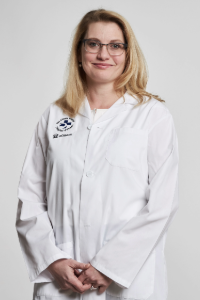
Dr. Barabara Vanderhyden
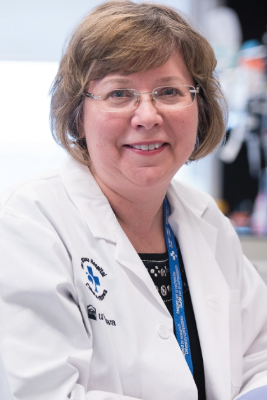
Dr. Barbara Vanderhyden has spent her career looking for the metaphorical missing pieces to some of ovarian cancer’s most complex puzzles. As a senior scientist at The Ottawa Hospital, professor at the University of Ottawa, and Corinne Boyer Chair in Ovarian Cancer Research, Dr. Vanderhyden’s work makes a 3,000-piece puzzle look like child’s play.
From her first award — the Soroptimist Award for her volunteering as a high schooler in 1978 — to the accolades she’s garnered since — including the Dr. J. David Grimes Research Career Achievement Award, the Capital Educator’s Award, and the Governor General’s Caring Canadian Award — Dr. Vanderhyden’s award-winning career has changed the way ovarian cancer is understood and treated today.
Learn why physiology is like a puzzle and why sucking eggs is a good thing in Dr. Vanderhyden’s lab.
The Ottawa Hospital is a leading academic health, research, and learning hospital proudly affiliated with the University of Ottawa.


